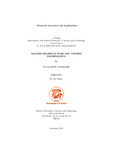| dc.description.abstract | This project is mainly focused on the theory of Monotone (increasing) Operators and its applications. Monotone operators play an important role in many branches of Mathematics such as Convex Analysis, Optimization Theory, Evolution Equations Theory, Variational Methods and Variational Inequalities. Basic examples of monotone operators are positive semi-definite matrices A of order n ∈ N (since they define linear operators on Rn and satisfy Ax, x ≥ 0 for all x ∈ Rn ), projection operators pC onto closed convex nonempty subsets C of a Hilbert space (since x − y, pC (x) − pC (y) ≥ 0 for
all x, y ∈ H), the derivative Df of a differentiable convex function f defined in a Banach space (since x − y, Df (x) − Df (y) ≥ 0 for all x, y ∈ dom(f )), and the elliptic differential operator −∆ on H 2 (Rn ).
Monotone operators which have no proper monotone extension are called
maximal monotone operators and are of particular interest because they are
crucial in the solvability of evolution equations in Hilbert spaces as they
generate semigroup of bounded linear operators.
In this project, we first study some fundamental geometric properties of
Banach spaces, the topological properties of the duality mapping J : X →
∗
2X of a Banach space X defined by
J(x) :=
f ∈ X∗ :
x, f = x
f and f = x
and after recalling some results from Convex Analysis, we observe that J is
2
the subdifferential of the convex functional x → ||x|| .
2
Secondly we study the general properties of maximal monotone operators.
In the case of a reflexive Banach space X, we have remarkable results such
as:
- The Rockerfella’s characterization of the maximality of a monotone (single
or multi- valued) operator defined on a reflexive Banach space, which
says that an operator A is maximal monotone on X if and only if
R(A + λJ) = X ∗ , for some λ > 0.
- Every monotone and hemicontinuous operator is maximal monotone.
- Every maximal monotone operator which is coercive on X (e.g., J) is
surjective.
Lastly we present another version of the Rockerfella’s characterization with a
shorter proof following C. Simons and C. Zalinescu [7], and we mention some
applications of the surjectivity result for monotone operators to nonlinear
elliptic equations in the line of Lions [10]. | en_US |

